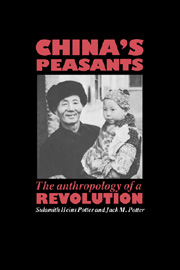Book contents
- Frontmatter
- Contents
- List of illustrations
- List of tables
- Preface
- Notes on the text
- Map 1 China
- 1 The old “feudal” order: Zengbu before Liberation
- 2 Establishing the new order
- 3 The ordeal of collectivization
- 4 The Cultural Revolution
- 5 Maoist society: the production team
- 6 Maoist society: the brigade
- 7 Maoist society: the commune
- 8 Impatient aspirations: transition to the post-Mao period
- 9 The cultural construction of emotion in rural Chinese social life
- 10 Marriage, household, and family form
- 11 Chinese birth planning: a cultural account
- 12 Lineage and collective: structure and praxis
- 13 Party organization
- 14 The party ethic: a devotion born of distress and enthusiasm
- 15 A caste-like system of social stratification: the position of peasants in modern China's social order
- 16 The Chinese peasants and the world capitalist system
- 17 The crystallization of post-Mao society: Zengbu in 1985
- References
- Index
16 - The Chinese peasants and the world capitalist system
Published online by Cambridge University Press: 02 December 2009
- Frontmatter
- Contents
- List of illustrations
- List of tables
- Preface
- Notes on the text
- Map 1 China
- 1 The old “feudal” order: Zengbu before Liberation
- 2 Establishing the new order
- 3 The ordeal of collectivization
- 4 The Cultural Revolution
- 5 Maoist society: the production team
- 6 Maoist society: the brigade
- 7 Maoist society: the commune
- 8 Impatient aspirations: transition to the post-Mao period
- 9 The cultural construction of emotion in rural Chinese social life
- 10 Marriage, household, and family form
- 11 Chinese birth planning: a cultural account
- 12 Lineage and collective: structure and praxis
- 13 Party organization
- 14 The party ethic: a devotion born of distress and enthusiasm
- 15 A caste-like system of social stratification: the position of peasants in modern China's social order
- 16 The Chinese peasants and the world capitalist system
- 17 The crystallization of post-Mao society: Zengbu in 1985
- References
- Index
Summary
The question of the effects of the world capitalist system on the economic life of rural China has been an important subject of investigation and analysis for some fifty years. Although such topics are newly important in anthropology, where they are considered under the headings of world systems theory and dependency theory, they have a long history in research on China, and are familiar furniture of the mind, in Dewey's phrase, in the study of Chinese social life. The fundamental questions were originally formulated from within China, by such anthropological pioneers as Fei Hsiao-tung and Chang Chih-i, whose studies were made in the thirties and forties. Fei and Chang, like many other Chinese intellectuals of the time (cf. Meisner 1982, p. 84) took the position that economic contact with the West, as mediated by the treaty ports, was deleterious to the economic life of the surrounding countryside. This position was consistent both with Chinese culture, which is inclined to assert the intrinsic superiority of what is most purely Chinese and to ascribe responsibility for problems to outside influences, and with Marxist theory, which holds that capitalist intrusion would tend to destroy peasant economic systems.
It was Fei, in Peasant Life in China (1939) and in Earthbound China (with Chang Chih-i, 1945), who was the most influential anthropological proponent of this thesis. Fei and Chang argued that China had long relied heavily upon industrial employment.
- Type
- Chapter
- Information
- China's PeasantsThe Anthropology of a Revolution, pp. 313 - 326Publisher: Cambridge University PressPrint publication year: 1990



